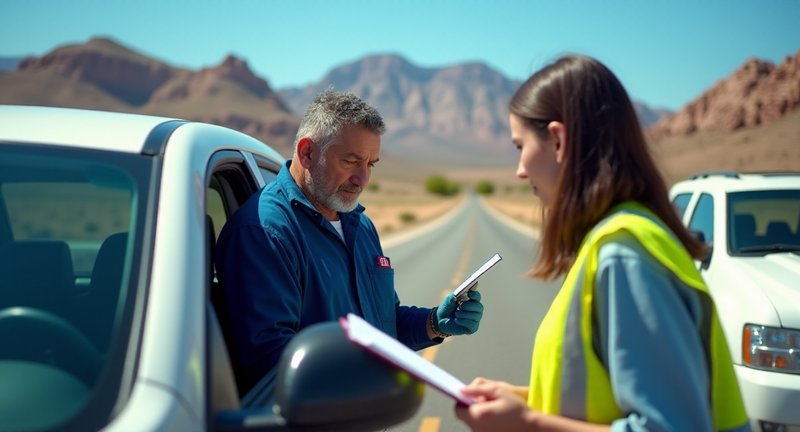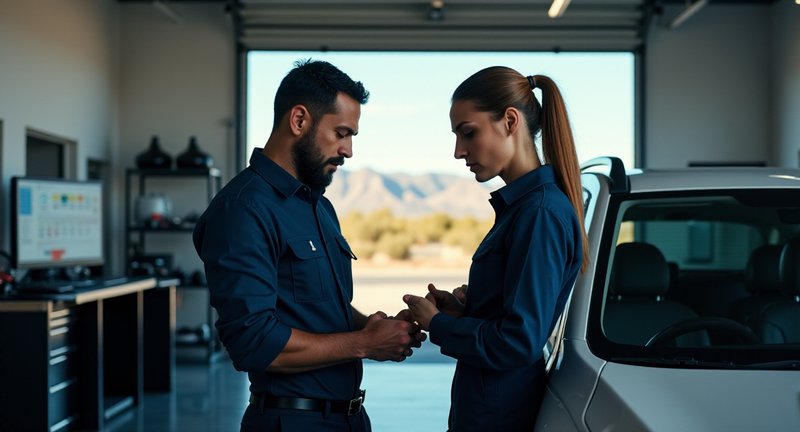An Introductory Look at Vin Inspection Nevada
When discussing exploring the Silver State, there’s more to think about than just the sights especially if you’re considering driving through those wide, open highways. One thing I never knew I’d need on a road trip was understanding ‘Vin Inspection Nevada’. It’s not the first thing you think of when preparing for a drive across the desert, but it’s crucial, particularly for new vehicles, classic cars, or any car brought into the state.

So, what’s this inspection about? Simply put, it’s Nevada’s way of ensuring your car’s Vehicle Identification Number (VIN) is legitimate and matches state records. Why should you care? Well, if you’re buying a car in Nevada or bringing one in from out of state, you won’t be able to register it without passing a VIN inspection. Here’s where it gets interesting though this is something many overlook until they’re at the DMV and suddenly realize there’s one more step before they can hit the road.
Key Things You Need to Know:
- Where it Happens: VIN inspections are usually done at DMV offices or by authorized law enforcement agencies.
- What to Bring: You’ll need the car’s title or proof of ownership, and make sure the vehicle is with you they can’t inspect it if it’s not there!
- The Process: It’s quick, taking just a few minutes. An inspector will check your car’s VIN against documentation to make sure it all matches up.
If you’ve got your eye on a Nevada adventure, remember to plan ahead for the Nevada vehicle identity check process. Trust me, you don’t want to be caught off guard when you’re itching to explore those desert landscapes.
The Importance of Vin Inspection Nevada
I’ve driven through the open roads of Nevada more times than I can count, and let me tell you, vehicle checks here are no small matter. In this desert state, ensuring your car’s history is crystal clear becomes especially vital. Imagine cruising down a sun-soaked highway, only to find out your car has unresolved issues from another state. Not the kind of surprise anyone wants, right?
Here in Nevada, inspections can reveal more than just the surface-level facts. They dig deeper into the story of your vehicle, unearthing hidden details that can impact its long-term performance. Trust me, overlooking this process could leave you dealing with consequences that stretch beyond the desert borders.
If you’re anything like me, you probably love the freedom that comes with a well-maintained ride. This inspection isn’t just paperwork it’s peace of mind. It’s like knowing the history of a house before you move in. You want to know who lived there, what’s broken, and if the foundation is solid.

One of the biggest things I’ve learned is that these checks aren’t just for the rule followers they’re for the smart ones. Taking this step seriously means you avoid unnecessary headaches on the road. No one wants to be stranded in the heat, miles away from the nearest town.
So, when you’re on the Nevada roads, remember that a thorough inspection isn’t just a formality it’s your ticket to smooth travels.
Understanding Vehicle Identification Numbers (VIN)
can feel a bit like cracking a code, but once you get the hang of it, it opens up a whole new world of information about your vehicle. Every car, truck, or motorcycle has a unique VIN that serves as its fingerprint. Let’s break it down in a way that makes sense.
First, a VIN is made up of 17 characters – both numbers and letters – each serving a distinct purpose. Think of it as a map to your vehicle’s identity, revealing everything from the manufacturer to the engine type.
Here’s what you can expect to find hidden in those characters:
- The first three digits tell you who made the car and where.
- Characters 4 to 8 provide details like the model, engine, and body type.
- The 9th character is a ‘check digit,’ ensuring the VIN is valid.
- The 10th character tells you the model year, and the 11th reveals the assembly plant.
- The last six digits are the vehicle’s unique serial number.
When you’re buying a used vehicle, you should always make sure the VIN matches across all parts – the dashboard, the door, and the engine. It’s a small detail that could prevent huge headaches later on.
Plus, running a VIN through an online database can tell you if the vehicle’s been in any accidents, has had recalls, or was ever reported stolen. It’s like doing a background check on the car you’re about to trust with your next adventure.
So, next time you look at your vehicle’s VIN, remember you’re holding a piece of its history right there in those 17 characters.
The Importance of VIN Verification
When you’re traveling, especially on a cross-country road trip or exploring unfamiliar regions, the last thing you want is an unexpected hiccup with your vehicle’s paperwork. Believe me, nothing throws a wrench into your plans like discovering a mismatch in your Vehicle Identification Number (VIN) documentation.
I’ve seen it happen too many times people set off on a journey without giving VIN verification much thought, only to get held up later. Trust me, getting your VIN sorted ahead of time is not only a smart move but an essential part of vehicle ownership, particularly when you’re transferring a title, moving across state lines, or purchasing a car from a different state. Here’s why:
- Ensures Accuracy: A VIN acts like your car’s fingerprint. If there’s a discrepancy, it could lead to administrative headaches, fines, or worse legal trouble.
- Prevents Fraud: Verifying the VIN is one way to confirm the car you’re buying is actually the car listed in the sale. This step prevents potential scams, such as vehicle cloning.
- Smooths Title Transfers: Especially important when selling or buying out-of-state vehicles. Without verification, you could get stuck in a web of bureaucracy, delaying your plans.
Another thing to consider is that VIN verification isn’t always straightforward. Depending on the state you’re dealing with, there might be unique requirements for completing the process. Some states might require physical inspections, while others may let you submit documentation remotely. Either way, making sure your VIN matches before you hit the road gives you peace of mind.
Bottom line? Don’t treat VIN verification as just another line item on a checklist. It’s one of those small but mighty steps that keeps your adventure rolling without a hitch.
Overview of Vehicle Inspections in Nevada
Before you hit the road in Nevada, whether you’re a resident or just passing through, understanding vehicle inspections is crucial. The Silver State has its own approach when it comes to making sure your ride is roadworthy. I’ve been through this process a few times myself, so let me walk you through the basics.
In Nevada, vehicle inspections go beyond just kicking the tires. If you’re registering a car from out of state or buying a used vehicle, there are a few key things you’ll need to be aware of. Here’s a quick rundown:
-
Emissions Test: In certain counties like Clark and Washoe, smog tests are required for most vehicles. These tests help Nevada maintain clean air, especially in urban areas. Make sure your car’s exhaust system is up to snuff, or you might be seeing a lot more of the testing station than you’d like.
-
Vehicle Identification: When registering a car that’s new to Nevada, an inspection of the vehicle’s identification number (VIN) is a must. This isn’t about nitpicking, but more to ensure the car’s history is transparent and nothing fishy is going on.
-
Safety Checks: Although Nevada doesn’t have a standard safety inspection for every car on the road, it’s smart to get your brakes, lights, and tires checked anyway. Nobody wants to find out about a brake issue when cruising the long desert highways.
I always recommend making sure your paperwork is in order before heading to a DMV or inspection station. A little preparation goes a long way to avoid multiple trips and trust me, nobody wants that.
Legal Requirements for VIN Checks
When you’re setting out to travel the open road, especially with a newly purchased vehicle, there’s one thing you cannot overlook: making sure your VIN (Vehicle Identification Number) is squeaky clean in the eyes of the law. Believe me, it’s not the most glamorous part of prepping for your adventure, but it can save you from future headaches.
First things first, let’s talk about why a VIN check is critical. Think of it as the passport for your car. The VIN is a unique identifier for vehicles, and it reveals the car’s entire history, including any red flags like past accidents, theft, or title issues. This small string of numbers could make or break your trip, especially if you’re driving cross-country or moving to a different state.
Now, depending on where you’re headed or what state you’re calling home, there are specific legal requirements for getting your VIN inspected. You might need to go through an official verification process to ensure the car meets local standards. Here’s a rundown of typical legal necessities you’ll encounter:
- Proof of Ownership: Always bring your vehicle’s title or bill of sale.
- Smog Certificate: Some states want proof that your car passes emissions standards.
- Odometer Reading: Required to prevent tampering, especially for older vehicles.
- Fees: Yes, there’s always a fee. It varies by state, but don’t be surprised to shell out some cash for the process.
Certain states, especially if you’re transferring a car from out of state, are more stringent in verifying the VIN. A state officer or licensed mechanic may be required to give your car a once-over. The last thing you want is to be blindsided by an overlooked legal detail, trust me. So, it’s worth double-checking all your paperwork before you hit the road!
How VIN Checks Affect Vehicle Title Transfers
When you’re in the middle of a vehicle title transfer, especially in another state, things can get a little tricky and this is where VIN checks play a crucial role. Trust me, I’ve gone through this process, and understanding the significance of a VIN check can save you a lot of headaches down the road.
First off, VIN checks are essential because they confirm the vehicle’s history. Without a clean VIN check, a title transfer may not even be possible. Here’s why they matter:
- Proof of Authenticity: A VIN check ensures that the car you’re buying hasn’t been altered or tampered with, safeguarding you against stolen vehicles or cloned VINs.
- Uncovers Hidden Issues: Think about hidden skeletons in a closet! VIN checks reveal any hidden accidents, salvage titles, or significant repairs that might be lurking in the car’s past.
- Legal Requirement: Many states require a VIN check as part of the title transfer process. It’s not just a bureaucratic step; it’s there to protect you.
When transferring a vehicle title, the VIN check will be one of the first things authorities look at. If there’s any mismatch or inconsistency in the vehicle’s records, you’ll hit a roadblock. You don’t want to be caught off guard with a surprise issue at the last minute, especially when you’re ready to drive your new set of wheels off into the sunset.
So, make sure you get that VIN check done early. It’s a crucial step, not just for the paperwork, but for your peace of mind.
The Process of Conducting a VIN Inspection
Conducting a Vehicle Identification Number (VIN) inspection can feel like peeling back the layers of an intriguing mystery. It’s not just about checking a number; it’s about uncovering the story behind the vehicle. I remember my first experience with a VIN inspection vividly, and it felt like a rite of passage into the world of automotive ownership.
So, what does this process entail? Here’s a quick rundown from my journey:
-
Gather Necessary Documentation: Before diving in, ensure you have all relevant documents handy. This may include:
- The vehicle title
- Registration papers
- Proof of ownership
-
Locate the VIN: Your vehicle’s VIN is typically found in several locations. You can check:
- The driver’s side dashboard (visible from outside the car)
- The driver’s side door frame
- Under the hood near the engine
-
Inspection Process: Once you have the VIN, it’s time for the inspection itself. During this phase:
- Verify that the VIN matches the documents.
- Check for any discrepancies, like altered or missing numbers, which can indicate potential fraud.
- Note the vehicle’s condition and any modifications that may affect its value.
-
Check History Reports: Using the VIN, access online services that provide detailed history reports. These reports can reveal:
- Previous accidents
- Service history
- Ownership changes
-
Complete the Inspection: If all checks out, you can proceed to complete any required paperwork. And voila! You’ve conducted a thorough VIN inspection.
I found this process not just informative, but also oddly satisfying, as it assures you of the vehicle’s authenticity. As you embark on your own VIN inspection journey, remember: every car has a story waiting to be discovered.
Common Reasons for VIN Verification
Getting a VIN inspection can feel like a hassle, but trust me, there are good reasons for it. One of the most common is registering a vehicle from out of state. Imagine moving to Nevada with your trusty car, only to find out you need a VIN inspection Nevada requires to ensure everything’s on the up-and-up.
Another reason you might need one is if you’re buying a used vehicle. It’s a way of double-checking that the car hasn’t had its identity tampered with. From my own experience, this small step saves you from potential headaches down the road. The Nevada vin verification process adds that extra layer of confidence when purchasing a pre-owned ride.
Transferring a car title is another instance where VIN verification comes into play. Whether you’re gifting your old clunker to a family member or passing on your prized sports car, the state still wants to verify the vehicle’s unique number. It’s more than just paperwork it’s about keeping everything official.
Also, after vehicle modifications or repairs, especially if significant, like a new engine, VIN verification ensures the car is still legally recognized. A Nevada vehicle identification inspection mandates might seem like overkill, but it’s designed to protect both buyers and sellers in the long run.
In my experience, this quick check can save a world of trouble later. You wouldn’t believe how many people overlook it and end up regretting it later!
The Full Scope of Vin Inspection Nevada
In relation to navigating vehicle ownership in Nevada, getting your VIN inspected is something you can’t avoid. It’s like a rite of passage for your car, ensuring everything lines up as it should. I remember the first time I had to go through the process, it felt a bit like jumping through hoops until I figured out how to streamline things.
The entire vehicle inspection isn’t just about some random numbers on your dashboard. It’s a thorough verification that ensures your car’s identity matches its paperwork. Here’s where things get interesting if you’ve ever moved here from out of state or bought a used car, you’re bound to encounter this.

Let me break it down in a way that makes it a little less intimidating:
-
What they check: The VIN, or Vehicle Identification Number, is inspected to confirm the car isn’t stolen, altered, or in any way suspicious. It’s also compared against the registration documents.
-
Where to go: Inspection locations aren’t limited to the DMV. Some authorized third-party providers can handle it too, which might save you from those DMV lines we all dread.
-
Cost factor: Depending on where you go, the fee could vary. You could find yourself paying a small service fee, but I always say, the convenience is worth it.
Remember, it’s not just about the number. It’s about peace of mind, knowing your car’s history is squeaky clean and officially documented. Honestly, it’s a small but crucial step in the grand scheme of Nevada vehicle ownership. Now, the next time you’re in line for one of these, you’ll know exactly what to expect.
What to Expect During a VIN Inspection
When I first encountered the VIN inspection process, I didn’t know what to expect. It can seem daunting, but understanding what unfolds can make it a breeze. Here’s a glimpse into the world of VIN inspections, drawn from my own adventures.
What Happens During a VIN Inspection?
-
Visual Verification: The inspection begins with a thorough visual examination. Inspectors check the Vehicle Identification Number (VIN) against the documents you provide. This is where the magic happens! They ensure everything matches up, leaving no room for discrepancies.
-
Documentation Delight: You’ll need to present a few key documents. Typically, these include:
- Title of the vehicle
- Proof of insurance
- Registration documents
-
Inspection Area: Expect to find yourself in a designated area, often outside or in a specialized facility. The atmosphere can vary, from bustling inspection centers to quiet garages, but there’s always a sense of purpose in the air.
-
Condition Check: Beyond just the VIN, the inspector might take a peek at your vehicle’s overall condition. Things like:
- Lights and signals
- Tires
- Brakes
- Exhaust system
-
Final Thoughts: Once everything checks out, you’ll receive a report indicating the vehicle’s compliance. It’s a reassuring moment knowing your vehicle is ready for the road ahead.
Embracing this experience can transform it from a mere requirement into an opportunity to ensure your vehicle is in prime condition. So, when you head into your inspection, consider it a chance to reconnect with your ride.
Tips for Preparing Your Vehicle for Inspection
Preparing your vehicle for inspection can feel like getting ready for a first date nervous energy mixed with a dash of excitement. I remember my first inspection; I wanted everything to be perfect.
Start with the basics: check your lights. You don’t want to be the one fumbling in the dark with a burnt-out bulb. Test your headlights, brake lights, and turn signals. Trust me, a quick flick of the switch can save you from a minor disaster.
Next, let’s talk about fluids. Engine oil, coolant, and brake fluid should all be at optimal levels. Picture your vehicle as a marathon runner; it needs to be hydrated and ready to perform. I like to carry extra oil and coolant just in case better safe than sorry!
Don’t forget the tires. They’re your vehicle’s only connection to the road, and they deserve some love. Check the pressure and tread depth. If you’ve got a spare lying around, make sure it’s in good shape too. You never know when it might come in handy.
As a matter of fact, take a good look at your windows and mirrors. Clean them inside and out; a clear view is crucial. And while you’re at it, give your car a little TLC with a wash. Nothing says “I care” like a shiny vehicle ready to impress.
Remember, inspections are not just about compliance; they’re an opportunity to show your car a little appreciation. Enjoy the process, and your vehicle will thank you!
Choosing the Right Inspection Facility
Choosing the right inspection facility can feel like a journey in itself. With so many options, it’s like standing at a fork in the road, trying to decide which path leads to peace of mind.
First, consider the reputation of the facility. I’ve learned that a few glowing reviews can often lead you to hidden gems. A place where past customers share their positive experiences can give you a sense of comfort, like a warm cup of coffee on a chilly morning.
Next, think about convenience. Location matters, especially if you have a busy schedule. When I found a facility just a stone’s throw away from my home, it was a game-changer. No more long drives or wasted time!
Don’t forget to check for certifications and expertise. Knowing that the technicians have the right training feels like having a seasoned guide on a thrilling adventure. You want someone who knows the ins and outs of their craft.
Also, consider the atmosphere. A welcoming facility makes the inspection process much less daunting. When I walked into one inspection center, the friendly smiles and relaxed vibe put me at ease, transforming a potentially stressful situation into a pleasant experience.
In the end, trust your instincts. The right inspection facility will resonate with you, like a well-composed melody that just feels right. Take your time and choose wisely you won’t regret it!
Cost of VIN Inspections in Nevada
In relation to getting a Vehicle Identification Number (VIN) inspection in the Silver State, it’s a good idea to know what you’re getting into financially. From my personal experience, I found that the cost can vary quite a bit depending on where you go and what additional services you might need. Here’s a breakdown of what to expect:
Factors Influencing Costs
- Location: Different counties or cities might have varying rates. Urban areas tend to be pricier than rural ones.
- Inspection Type: A basic inspection usually costs less, while a more detailed one especially for modified vehicles can be more expensive.
- Additional Services: Some places offer extras like document preparation or emissions testing, which can bump up the price.
Typical Price Range
- Basic Inspection: $20 – $50
- Comprehensive Inspection: $50 – $150
- Specialized Inspections (e.g., for modified vehicles): $150 and up
Tips to Save
- Shop Around: Don’t just go with the first place you find. Compare prices and services.
- Check for Discounts: Some locations might offer deals for first-time customers or package deals if you need multiple services.
- Ask About Mobile Services: Sometimes, inspectors will come to you, which can save you time and possibly money if you factor in travel costs.
Navigating the ins and outs of VIN inspections can feel a bit overwhelming, but armed with this information, you’re better prepared to make a savvy choice.
Frequently Asked Questions About VIN Checks
When discussing VIN checks, I often find myself diving into a sea of questions. It’s like trying to decipher a secret code that can reveal a vehicle’s hidden history.
One of the most common questions I encounter is, ‘What exactly is a VIN?’ Well, it’s the unique identifier for your car, much like a fingerprint. This 17-character alphanumeric sequence can tell you everything from the make and model to whether it’s been in any accidents.
Another frequent inquiry revolves around where to get a VIN check. There are numerous online services that provide this information, but I always recommend sticking to reputable sources. Think of it as choosing a trustworthy guide for your travels better safe than sorry!
People often wonder how much a VIN check costs. To my surprise, many options are free! However, some comprehensive reports may require a small fee. It’s a bit like choosing between a budget hostel and a luxury hotel; it all depends on what you’re looking for.
Then there’s the question of how often you should perform a VIN check. I believe it’s wise to do one before purchasing any used vehicle. It’s like peeking behind the curtain to see what’s really going on.
Also, I frequently hear, ‘Can a VIN check protect me from fraud?’ Absolutely! This check can uncover any discrepancies in the vehicle’s history, acting as your first line of defense against potential scams.
So, if you’re considering a vehicle purchase, don’t skip this essential step. It might just save you from a world of headaches down the road.
Know More
How do I get a VIN check in Nevada?
To obtain a VIN check in Nevada, you can visit the Nevada Department of Motor Vehicles (DMV) website or any local DMV office. They provide services for checking vehicle identification numbers to ensure that the vehicle’s history is clear of any issues such as theft, salvage status, or accidents. You may need to provide your vehicle’s VIN and some personal information to receive the report. Additionally, various online services can also provide VIN checks for a fee.
How much is a VIN inspection in Las Vegas?
The cost of a VIN inspection in Las Vegas typically ranges from $10 to $50, depending on the specific service provider and whether any additional checks are required. It’s advisable to contact local inspection stations or the DMV to get the most accurate pricing. Some service providers may offer discounts or package deals, especially if you need other services, such as emissions testing or vehicle registration.
Does Nevada require vehicle inspections?
Yes, Nevada does require vehicle inspections in certain cases. New residents must have their vehicles inspected for compliance with state regulations, especially if the vehicle is from out of state. Additionally, vehicles that are older than a specific age may also need emissions testing. It’s important to check with the Nevada DMV for the latest requirements, as they can change based on local regulations and environmental policies.
How much is a vehicle inspection in Nevada?
The cost of a vehicle inspection in Nevada varies widely, generally ranging from $20 to $50. This price can depend on the type of inspection needed whether it’s a general safety inspection or an emissions test. It’s recommended to check with the local DMV or authorized inspection stations to get the most accurate and up-to-date pricing, as well as any additional fees that might apply for re-inspections or other services.
Can I check my VIN online?
Yes, you can check your VIN online through various websites that offer vehicle history reports. Some reputable services require a small fee to access detailed reports, while others might provide basic information for free. Be sure to use trusted platforms to ensure the accuracy of the information you receive, as a comprehensive VIN check can reveal essential details about the vehicle’s past, including accidents, title issues, and service history.
How can I get a VIN report?
To obtain a VIN report, you can use online services like Carfax, AutoCheck, or the National Motor Vehicle Title Information System (NMVTIS). These platforms typically require you to enter the VIN and may charge a fee for detailed reports. Alternatively, some local DMV offices may provide VIN reports, though availability and pricing can vary. It’s wise to compare the information provided by different services to ensure you get a comprehensive view of the vehicle’s history.
Are VIN checks worth it?
VIN checks are definitely worth it if you’re considering purchasing a used vehicle. They can uncover critical information such as past accidents, title discrepancies, and whether the car has been reported stolen. This information can save you from making a potentially costly mistake. Knowing the vehicle’s history helps you negotiate a fair price and ensures that you are making a sound investment in your next car.
Are VIN checks free?
While some basic VIN checks may be available for free through certain websites, comprehensive vehicle history reports usually come with a fee. Free checks might provide limited information, but if you want detailed insights regarding accidents, title history, and ownership records, you’ll likely need to pay for the report. It’s important to choose reputable sources to ensure the reliability of the information provided.
What is the cheapest way to check VIN number?
The cheapest way to check a VIN number is often through state DMV websites, which may provide basic information at no cost. Alternatively, some online services might offer a trial or limited free report. However, if you’re looking for more comprehensive details, using a paid service that specializes in vehicle history might be necessary, but comparing prices among different providers can help you find the best deal.
How can I check my VIN number without paying?
To check your VIN number without incurring costs, you can visit the DMV website for your state, which sometimes offers free basic checks. Additionally, websites like the National Insurance Crime Bureau (NICB) allow you to check for stolen vehicle reports at no charge. While these free services may not provide full vehicle history, they can give you important information without any fees.
What do you need for a smog check in Nevada?
For a smog check in Nevada, you’ll typically need to bring your vehicle to an authorized inspection station along with your vehicle registration and proof of insurance. It’s advisable to have any necessary maintenance completed beforehand, such as checking the engine and exhaust systems, to ensure your vehicle passes the test. Also, some locations may require identification, so check with the specific station for their requirements.
Do I need a Nevada driver’s license to register a car in Nevada?
Yes, to register a car in Nevada, you generally need to have a valid Nevada driver’s license or identification card. This requirement helps ensure that vehicle registrations are tied to a legitimate resident of the state. If you are new to Nevada and don’t yet have a state-issued license, you may need to provide alternative identification and proof of residency while registering your vehicle.











What a fantastic breakdown of the VIN inspection process! I still remember my first time, feeling like I was about to unveil some big secret. I made sure to gather all my docs, and when I found the VIN under the hood, I felt like a detective! I think the best part was when I checked the history reports. It’s amazing how much you can learn about a vehicle’s journey. My advice to anyone doing this for the first time is to take your time; it’s worth it. Plus, having all your documents organized ahead of time makes everything smoother. I even made a little checklist for myself, and it helped me stay on track. In the end, it was not only informative but also oddly gratifying. So, for those embarking on this adventure, enjoy the process it’s like uncovering the hidden history of your future car!
I totally agree about the importance of VIN checks! I remember my friend getting stuck with a car that had a hidden accident in its past. It was such a hassle to sort out, and if they had just done the VIN check first, they could have avoided all that trouble. Great advice!
Spot on with the VIN importance! It’s the unsung hero of car prep, right? I’ve come to think of it as my vehicle’s life story. Checking the VIN before a big trip not only protects you from potential legal troubles but also gives you peace of mind knowing you’re driving something reliable. I once got a VIN check for a used car that revealed a major accident I wasn’t aware of, and it totally saved me from making a bad decision. It’s incredible how many people don’t realize that this little number can unlock so much information about their vehicle. I love how you highlighted the importance of double-checking everything, especially with varying state laws. A great reminder that being proactive is always better than dealing with the aftermath!
Ah, the joys of navigating vehicle inspections in Nevada! I appreciate you breaking down the essential checks because I’ve been through the inspection wringer a few times. The emissions test can really catch you off guard if you’re not prepared, especially in Clark County. I remember one trip when my car failed the smog test, and I had to scramble to get repairs done before I could register it! It’s crazy how much attention these checks deserve, and you’re spot on about the safety checks too. Even though not required everywhere, getting those brakes and lights checked can save you from a potentially dangerous situation out on those long desert roads. Thanks for sharing these insights prepping for a road trip should always include a vehicle health check!
I completely agree! I’ve seen friends get tangled up in VIN issues during road trips, and it can be a real nightmare. It’s like you said, it’s not just a random number; it’s the car’s identity. I learned the hard way that double-checking VINs is essential, especially when buying used vehicles. One time, I almost bought a car that had been reported stolen! A quick VIN verification saved me from a massive headache. Plus, keeping your paperwork in order before hitting the road is a must! It’s those little things that make a big difference in having a smooth journey. Thank you for shedding light on this important topic; it’s so easy to overlook in the excitement of travel!
This breakdown of the VIN is super informative! I’ve always been fascinated by how much information is packed into those 17 characters. It really is like a car’s fingerprint! I remember checking a used car’s VIN before purchase and discovering it had been in a significant accident. It saved me from a huge headache! Your tips on where to check the VIN are also super helpful so important for anyone buying a vehicle. Thanks for sharing this knowledge; I’ll definitely spread the word!
Wow, your description of the importance of vehicle checks really hit home! I’ve had my fair share of road trips where I just hopped in the car, not thinking about the potential hidden issues lurking beneath the surface. Your analogy about knowing a house’s history is spot on. It’s not just about getting from point A to B; it’s about ensuring the ride is enjoyable and stress-free. The last thing anyone needs is to break down in the middle of nowhere, especially in the scorching Nevada heat! I’ve always seen these inspections as a hassle, but now I see them as a smart investment in my car’s health and my peace of mind. Thanks for sharing this valuable perspective!
I absolutely agree with your insight about the importance of a VIN inspection in Nevada! It’s so easy to overlook until you’re stuck at the DMV, and nobody wants that frustration, especially when you’re eager to hit those stunning open roads. I learned this the hard way on a trip to Las Vegas. I assumed my car was ready to go, but then I had to make an unexpected stop for an inspection, which added hours to my travel time! I wish I had read this beforehand definitely going to keep this in mind for my next road trip. Thanks for the great tips!